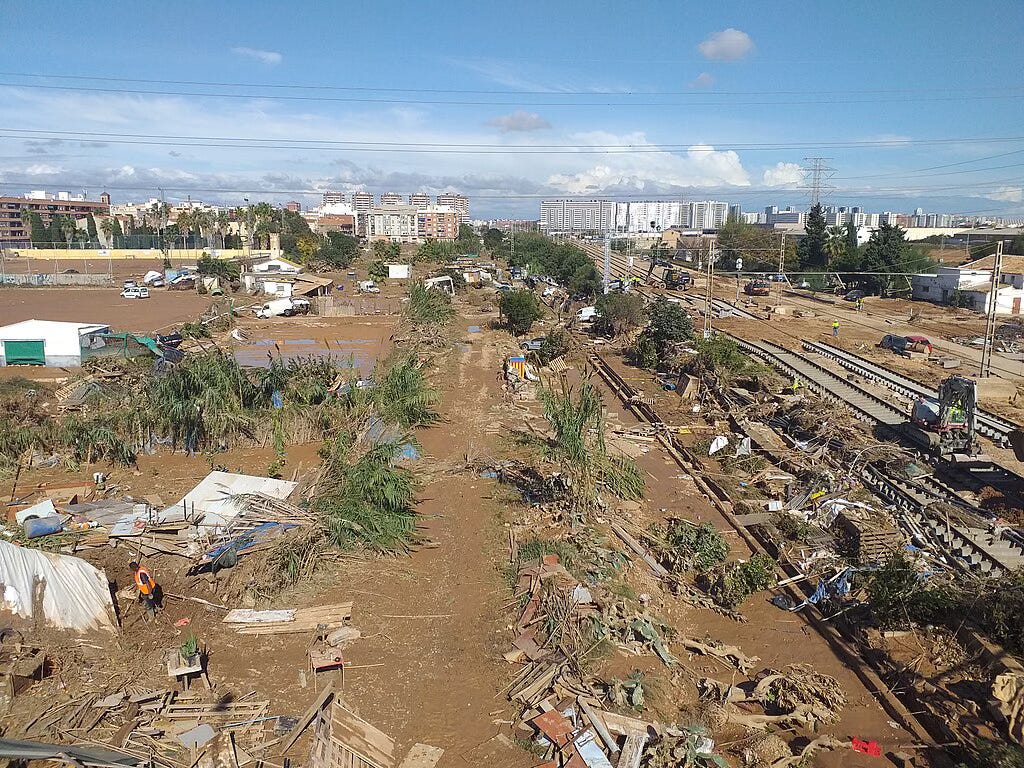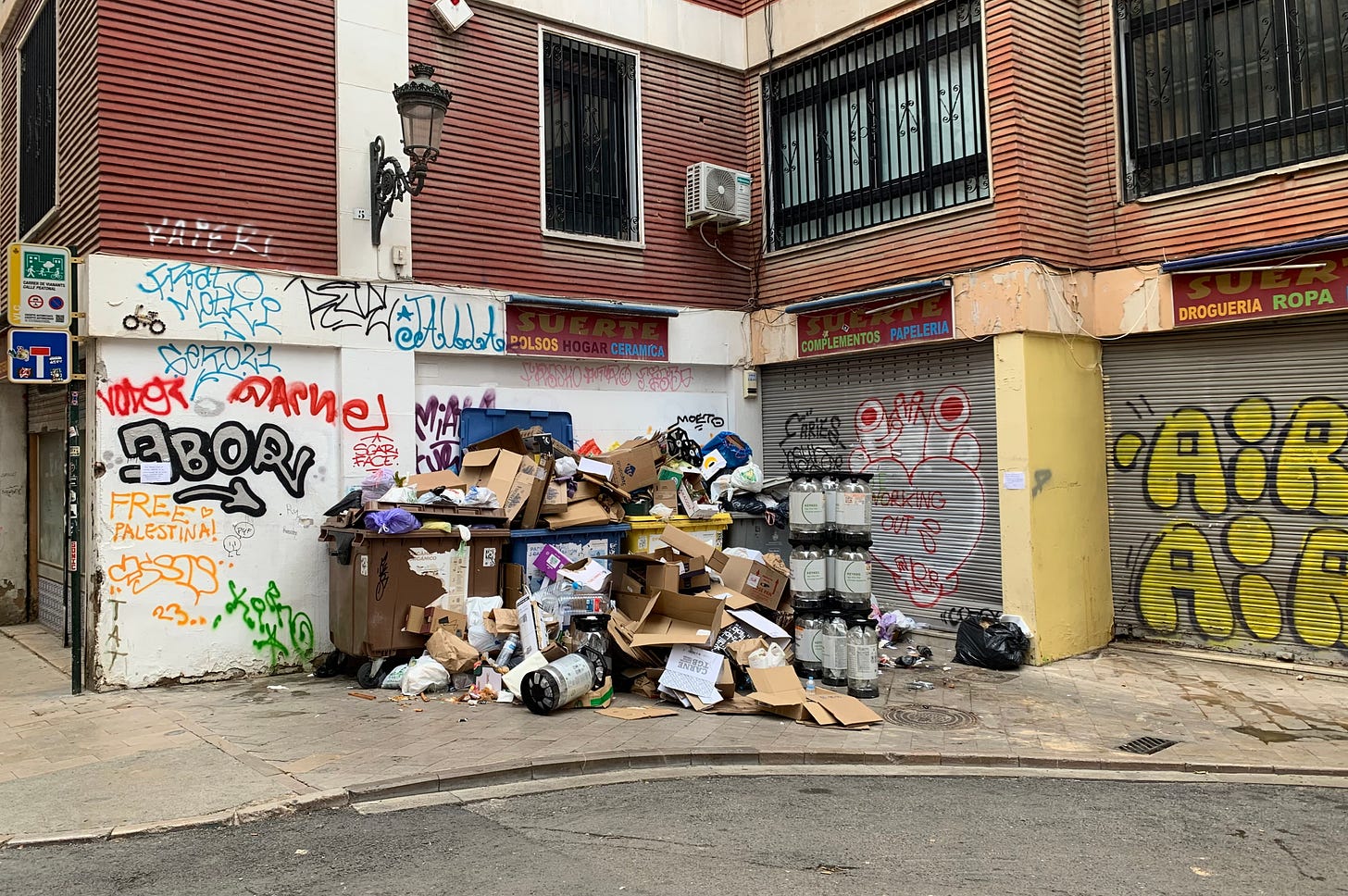A message from València
In València, normality has ruptured.

The region I live in, València, Spain, has been hit by Europe’s worst natural disaster in 50 years. I was lucky not to be directly affected by the storms or flooding, but there has been a knock-on effect as the level of disruption is reminiscent of the pandemic. Essential items in shops are missing, schools have closed, rubbish is piling up in the streets, large parts of the transport network have ceased to function, and people speak of nothing else but the DANA. It is a taste of a future, the worst of which we must work to avoid.
While Liner Notes focuses on music, music is intimately connected to the world and its issues. Due to the exceptional circumstances, I will describe what I am witnessing around me since I believe there is an artistic responsibility to acknowledge climate change similarly to how artists once responded to the Industrial Revolution (as with William Blake’s famous phrase the ‘dark Satanic Mills’, that is often interpreted as a critique of industrialisation).
When one says that the world has heated by 1.1° C since pre-industrial levels it sounds insignificant, but music teaches you that small imbalances can have large effects. A musician who is either slightly out of tune or slightly out of time can ruin an entire performance. The ecological harmony of the last 11,700 years of the Holocene era provided us with a period in which to thrive. Last week, when 500 litres per square meter fell in 8 hours in the mountain village of Chiva, it demonstrated how radically 1.1° C of global heating can change our way of life.
In València, normality has ruptured. Military Chinooks fly over the city on their way to deliver food, clothes, and medicine to nearby villages and suburbs. Tramatised climate refugees are evacuated from the mountains in tractor-trailers. One of Europe’s loudest cities is now quiet, empty of the tourists that normally fill its bustling streets. The church bells toll slowly and mournfully, expressing grief for the 217 people known to have died so far.
A friend who drove from Alicante to València (video below) described it as being like scenes of destruction from a horror film: cars flung into trees, shops flattened and covered in rancid mud, and hundreds of caged chickens trapped in a crashed lorry. A taxi driver recounted how many of her colleagues’ vehicles were swept away by the floods, destroying their livelihoods instantly. A neighbour told me of how her son’s small factory flooded, breaking two machines that were integral to the business. A friend who helped clean up a nearby village spoke of the heartbreaking experience of recovering someone’s family photo from the mud, only to have to throw it into a skip.
Yet amid the destruction, hope manages to shine through. Ten thousand volunteers piled into coaches to help clean up and remove the rubble from the streets of affected areas. Communities rallied to get food, clothes and other essential items to help those in most desperate need. One sees volunteers — mostly young, often teenagers — returning from affected areas covered in the mud from the streets they have swept. Valèncians by their nature are robust, salt-of-the-earth people, so their immediate instinct to help others comes as no surprise. While they have been let down by their slow and ineffective government — which failed to provide sufficient warnings about the floods, nor sufficient help to deal with the aftermath — they have taken matters into their own hands and are helping each other.
I do not doubt that València will rebuild itself as a community and city, but I question how it will rebuild its sense of hope for the future. Across the world, people are already struggling to envision a meaningful future, which is made harder in the aftermath of an intense natural disaster. When surrounded by destruction, cheap bromides and glib reassurances about the future offer little comfort. The hope I am referring to is not a passive and superficial optimism, but a hope that acknowledges the world’s suffering while offering the ideas and motivation to rebuild it.

Though it is not the role of artists to offer a detailed vision of the future — a bad habit that leads to the blurring of propaganda and art, and the temptation of utopian thinking (both of which can be found in William Morris’s tedious novel News From Nowhere) — art can shape the spirit of the age and make way for the belief in a meaningful future. It might be true that hope is not a meaningful strategy, but it is equally true that there is no meaningful strategy without hope. The environment cannot be left to environmentalists, who, for all their virtues, often suffer from an excessive appetite for catastrophising, which though often understandable, overlooks the irrepressible human desire to seek a brighter and better existence.
In 2009, after reading ex-NASA scientist James Hanson’s excellent book Storms of My Grandchildren I felt concerned about how such storms might manifest. Last week, I stood on the roof of my block of flats, watching dark clouds strobing with lightning as they raced across the sky and towards the mountains. In a matter of hours, they had claimed the lives of hundreds of people. Of the many tragic stories, the one I cannot forget is that of two parents swept away in a flash flood while their young children were at school.
It is clear we need a deep systemic change, which as ever, comes from the bottom up. If good can come from the horrible destruction in Valencia, it will be to provoke the emergence of new ideas about the world and our place in it. All of us are perilously migrating from the Holocene into the Anthropocene, but how we make that journey and where we end up remains in our hands. Artists are responsible, at the very least, for acknowledging that reality, or better yet, for helping forge the spirit of the day. If there is an absense of meaningful hope it will be filled with the fear and division we have already seen spreading across the world. The challenge is vast, but so too is the human imagination and our desire to overcome adversity. Rather than live in fear of the future, we need to imagine meaningful futures capable of inspiring the hope that is needed to bring them into being.
Possible actions
Subscribe to Bill McKibben's excellent Substack, The Crucial Years. He’s a climate scientist and activist who strikes that balance right between telling the truth and offering achievable paths to a low-carbon world.
Donate to help the victims of the DANA, you can use the following Red Cross information below.
If you are not local to the Valencian region, but would still like to help, The Red Cross has enabled different bank accounts so that donations can be made.
Santander – ES44 0049 0001 5321 1002 2225 33512
BBVA – ES92 0182 2370 4600 1002 2227 33467
Caixabank – ES28 2100 0600 8502 0196 0066 04057
Sabadell – ES31 0081 5232 2800 0108 4716 04048
Bankinter – ES75 0128 0010 9701 0012 1395 00087
Cooperativo – ES86 0198 0500 8020 2205 3421 02727
SMS: text HELP to 28092 to donate 1,20 €, 38088 to donate 3 € or 38092 to donate 6 €



Thanks for your words, Dom. We're all devastated by what has happened, and fear these situations are here to stay (I live in the Spanish Mediterranean as well, after all...).
I'm relieved to hear that you and your family are okay, Dom, and I worry and mourn with you the terrible climate disasters happening in Valencia and other places in the world. As you know, some regions of the US have all-too-recently experienced otherwise unheard of catastrophes. It's difficult to grasp how we can continue to turn a blind eye to what is happening.